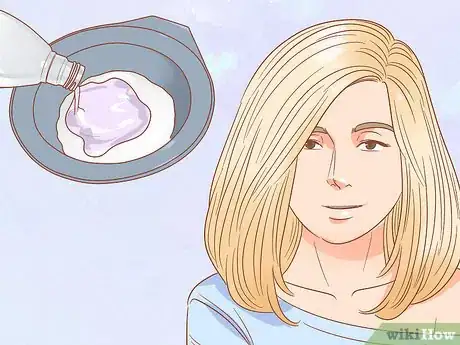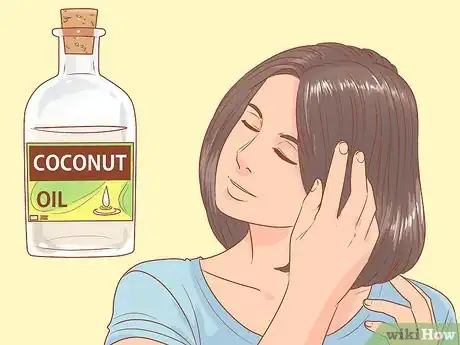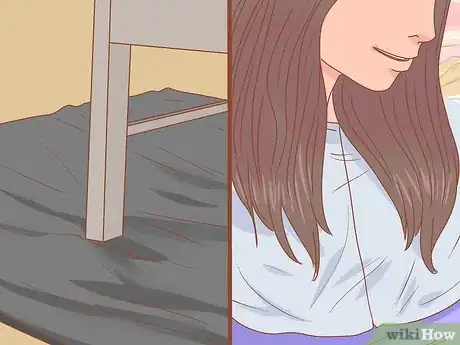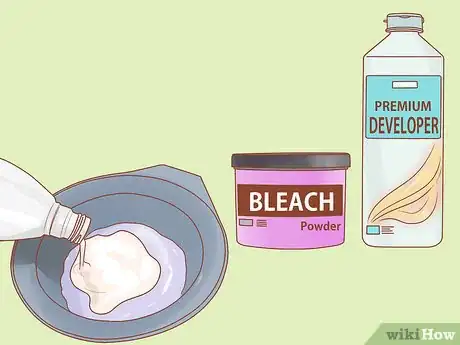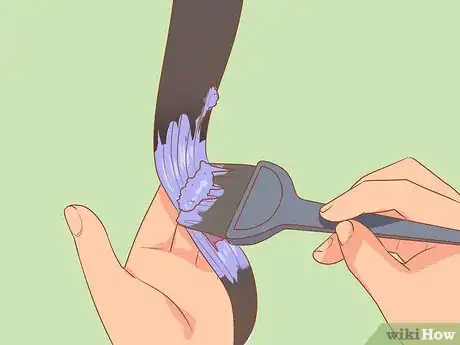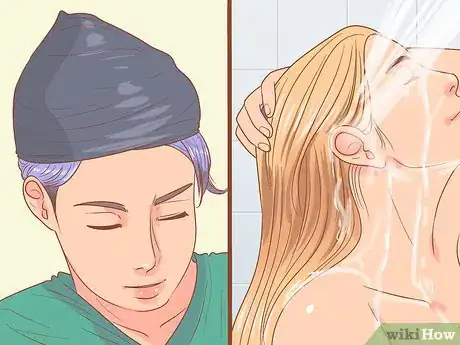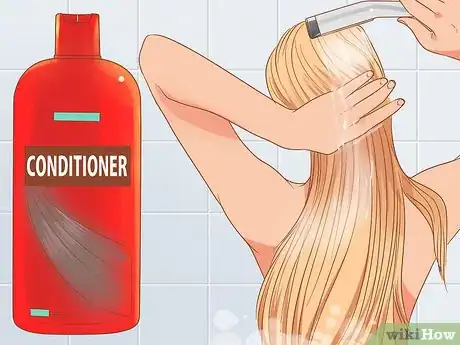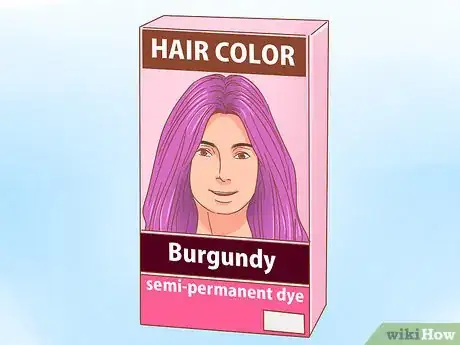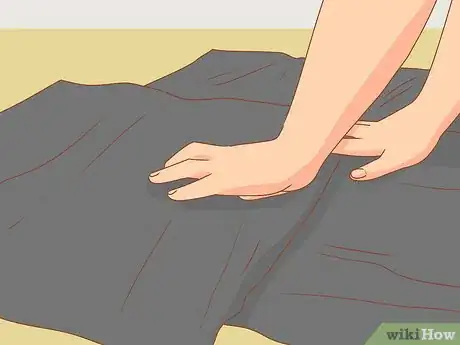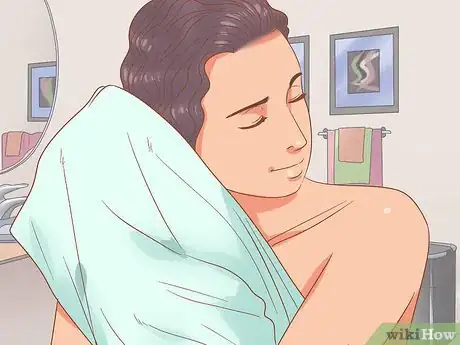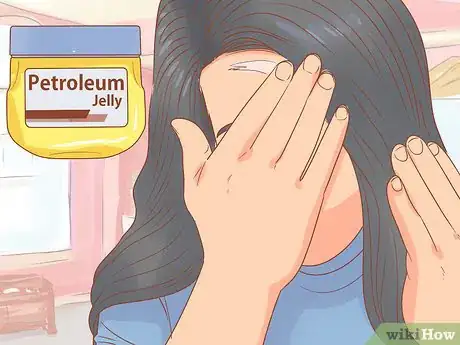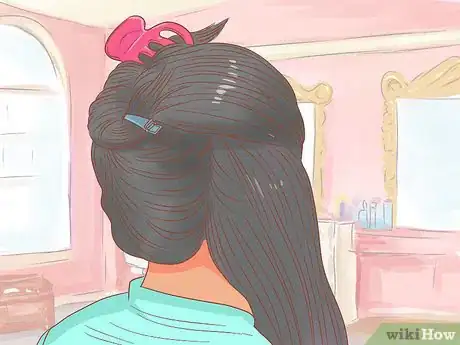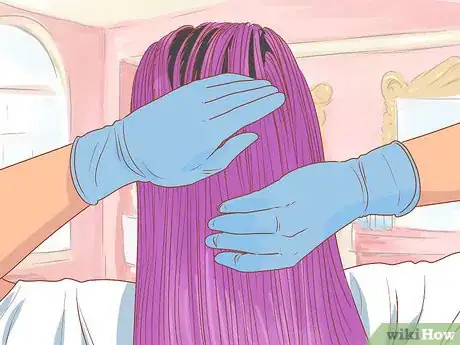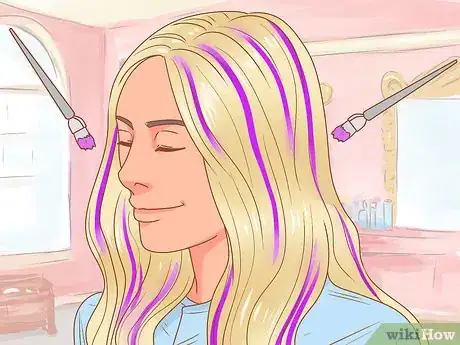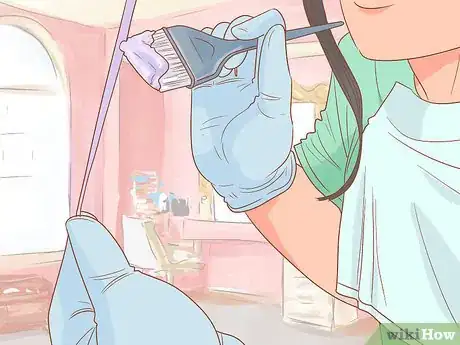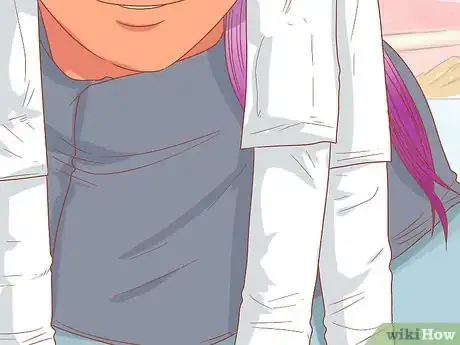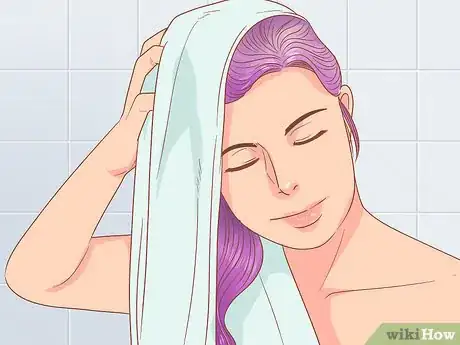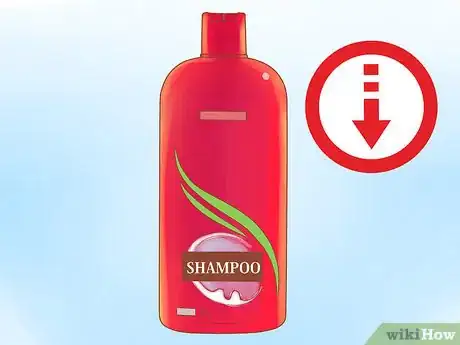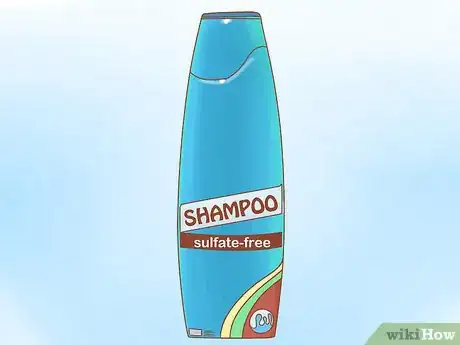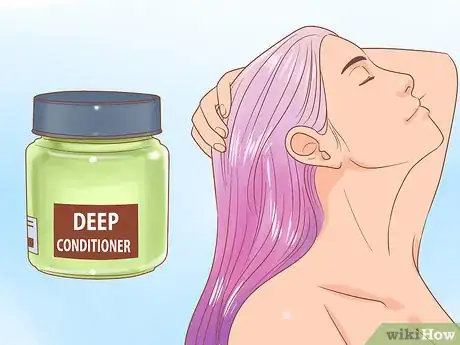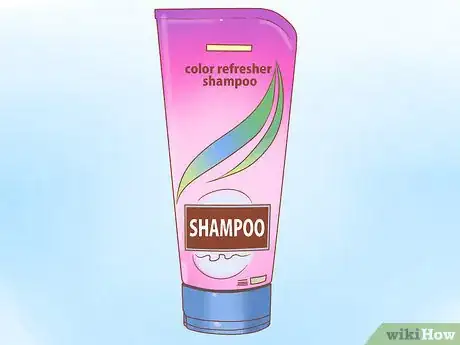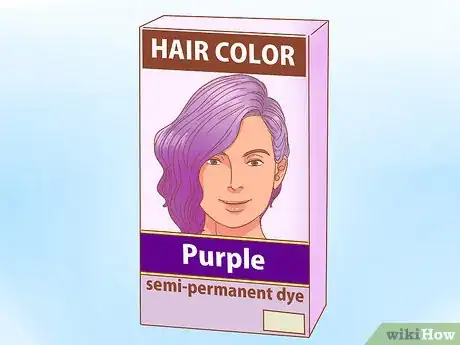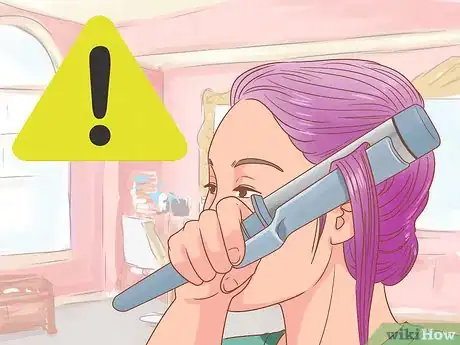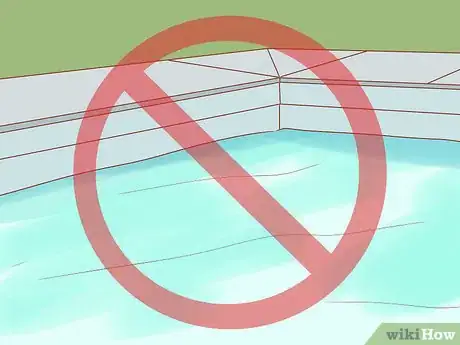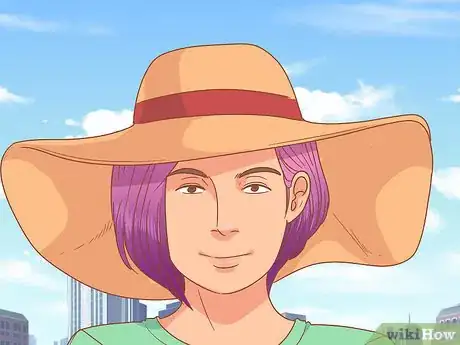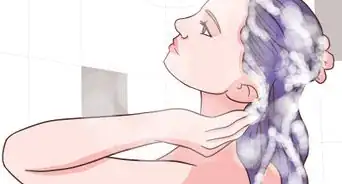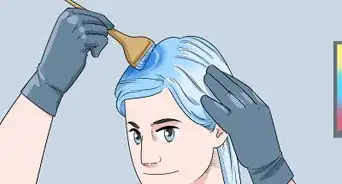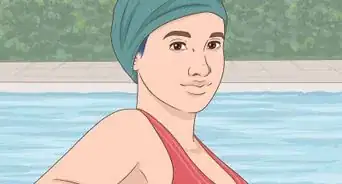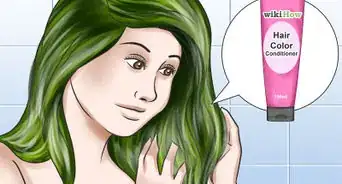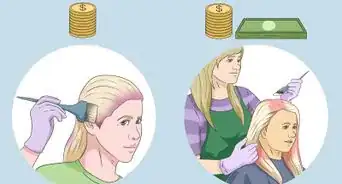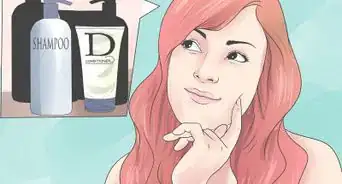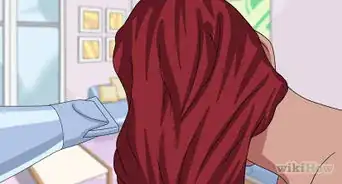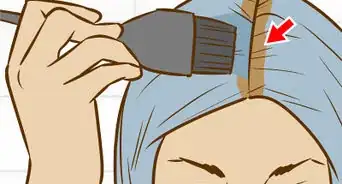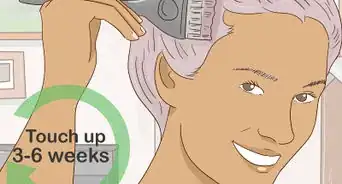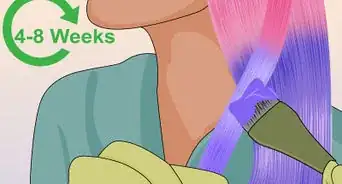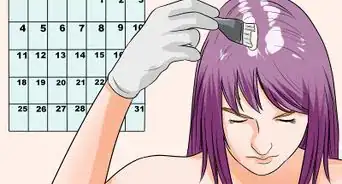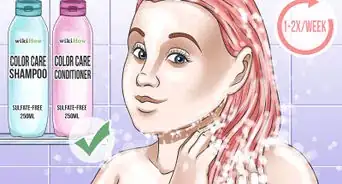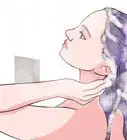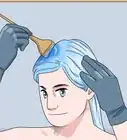This article was co-authored by Brianna Bowling and by wikiHow staff writer, Amy Bobinger. Brianna Bowling is a Hair Stylist and the Co-Owner of The CRAFT Salon in Glendora, California. With more than 11 years of experience, she specializes in balayage, blonding, and vivid colors. Brianna has received years of in-depth training on advanced color techniques.
There are 10 references cited in this article, which can be found at the bottom of the page.
This article has been viewed 37,097 times.
Dyeing your hair bold colors is a great way to express yourself. Purple is a color that symbolizes prosperity, power, and excitement, and it looks good on a variety of different skin tones. If you want to dye your hair purple, you may need to bleach your hair first, although you may be able to create a base on dark hair with plum or burgundy dye instead. However, if you'd prefer to try out purple hair without committing to dye, there are options for you, as well!
Things You Should Know
- Bleaching your hair is usually required if you want that bright, vibrant purple and you don’t have naturally light hair.
- If you don’t want to bleach your hair and it’s naturally dark, dye your hair plum or burgundy first and use that as the base.
- Avoid heat, chlorinated pools, and excessive sun after you dye your hair to preserve the pigment.
- You may need to reapply the dye every 6 weeks or so if you want to keep your hair on the brighter side.
Steps
Bleaching Your Hair if Needed
-
1Bleach your hair to get the most vibrant purple results. If you have dark hair and you want your purple dye to be very bright, you’ll need to lighten your hair as much as possible first by bleaching it.[1] Since bleaching is a harsh chemical process, it’s best to have it done at a salon by an experienced colorist, but you can do it yourself if you're comfortable experimenting with your hair.[2]
- Most rainbow-colored dyes, including purple shades, are semi-permanent or temporary, which means they will not lighten your hair when you apply them. Because of this, they may not show up as well on dark hair.
- Bleaching may not be safe for your hair if it’s been previously colored or chemically treated. Also, if your hair is very thick or dark, it may take several bleaching sessions before you get the color you desire. If any of these are true for your hair, consult a stylist before attempting to bleach at home.
-
2Apply coconut oil to your hair the night before you bleach it for extra protection. Soaking your hair in coconut oil the night before can help prevent damage due to bleaching, especially if your hair is thick or coarse. Rub a small amount of coconut oil into your palms, then distribute it evenly through your hair. Only use a little, since you don’t want the oil to prevent the bleach from soaking into your hair the following day.[3]
- The amount of coconut oil you need will depend on your hair thickness and length. Start with a pea-size amount, then use more if needed.
Advertisement -
3Protect your workstation and skin from the bleach. To prevent the dye from staining your skin or the surfaces in your home, lay down towels on the floor around you and drape a towel over your shoulders. Rub a little petroleum jelly around your hairline and the tops of your ears, then put on the gloves that came in the bleaching kit.[4]
- It may be helpful to have an extra pair of gloves nearby in case yours tear.
-
4Mix the ingredients according to the package directions. Typically, bleaching kits will come with a packet of bleach powder and a developer. Read the instructions thoroughly, then mix the products together, either in the provided container or in a glass or plastic bowl.[5]
- Do not mix bleach in a metal bowl, as it could create a chemical reaction.
-
5Use a brush to apply the dye to your hair. If you want your whole head to be purple, you’ll need to bleach all of your hair. Part each section of hair and brush on the bleach as close to your roots as you can without applying it directly to your scalp. Then, brush the bleach mixture all the way down your hair before moving to a new section.[6]
- If you only want a few purple streaks, you only need to bleach those areas.
-
6Leave the bleach on for the recommended amount of time, then rinse. Since bleaching is a harsh chemical process, it’s important not to leave the dye on for longer than instructed. Set a timer, and when the timer goes off, rinse your hair with cool water.[7]
- If your hair isn’t the color you wanted, you’ll need to wait a few weeks before you bleach it again. In the meantime, deep condition your hair frequently to keep it as healthy as possible.
- If you’re happy with the color, you can proceed to the purple dye. Since most purple dyes are non-toxic, you can apply them immediately after you bleach your hair.
-
7Condition your hair if you won't be dyeing it purple right away. Some bleaching kits come with a nourishing conditioner. If you're using the purple dye as soon as you finish bleaching, you may choose to wait and use this conditioner after that process. If you're not planning to dye your hair purple immediately, apply the conditioner according to the packaging instructions, then rinse it out after 3-5 minutes, or as directed.[8]
- Many temporary and semi-permanent dyes should be applied to clean hair, so a thick conditioner might interfere with your hair's ability to absorb the purple hue.
Applying the Purple Dye
-
1Use plum or burgundy dye first if you have dark hair and don’t want to bleach it. If you have dark hair and you want to dye it purple without using bleach, start by creating a base with a purple hint dye like plum or burgundy shade.[9] You can visit a stylist for this, or you can use a box dye at home. If you use a box dye, you can either apply it all over your hair or just to the areas you want to dye purple, such as highlights, the ends for an ombre effect, or the bottom layer of your hair for a peekaboo effect. Leave it on according to the package instructions, then rinse it out.[10]
- This will create a purplish base that will help your color show up better.
- The final result will depend on your hair’s color and texture, but if you use a highly-pigmented purple dye over this base, you should get a deep, rich purple hue.
- Keep in mind that using a box dye may be cheaper, but a color correction with a professional stylist will be expensive if you don’t like your results.
-
2Protect your work area before you apply the purple dye. Rainbow hues are notorious for getting everywhere when you use them, so before you dye your hair purple, you should probably remove anything from the area that you don’t want to get dye on, and lay trash bags on the floor. That way, if you spill or splatter the dye, it can’t soak through and stain your floors. Also, wear gloves and old clothes that are okay to get stained, and drape a towel or hairdresser’s cape around your shoulders so the dye doesn’t get on your skin.
- You might also want to keep a damp towel nearby to clean up any spills.
Tip: Wearing an old button-down shirt or bathrobe will save you from having to pull your shirt over your head when you get into the shower.
-
3Wash your hair with shampoo, then lightly towel-dry it.[11] While most permanent dyes work best on unwashed hair, semi-permanent and temporary dyes are best applied on freshly-washed, damp hair. The color will fade with each wash, so starting with clean hair will help to reduce the amount you need to wash your hair after dyeing it. Just use your regular shampoo, then blot your hair with a dry towel to get rid of excess moisture.[12]
- There’s no need to condition your hair. Conditioner seals your hair’s cuticle, so you don’t need to apply it until after rinsing out the dye. If your hair tangles easily, you can use a small amount of a lightweight conditioner. Just be sure to rinse it thoroughly.
-
4Spread a layer of petroleum jelly around your hairline to protect your skin. Some of the dye is likely to get on your skin when you’re coloring your hair, and while semi-permanent and temporary dye are typically non-toxic, it can still leave stubborn purple stains. To keep the dye off of your face, create a barrier by spreading petroleum jelly all the way across your forehead, on the tops of your ears, and behind your ears around to the back of your neck.[13]
- You can also use coconut oil or even a thick moisturizer.
-
5Use a comb and clips to divide your hair into sections.[14] Comb your hair to detangle it, then use your comb to part your hair into sections, and clip each one up. The exact number of sections you’ll use will depend on the length and thickness of your hair, but the idea is that you want it to be easy to fully saturate each section with dye.[15]
- If your hair is short and thin, you might only need to divide it into 2 sections in the front and 2 in the back. However, if you have very long, thick hair, you might need to clip your hair into 8 or more sections.
- It’s important to comb your hair before you dye it, since tangles could make the dye go on unevenly.
-
6Apply the purple dye all-over if you want to dye your whole head. You can use your hands if you like, but make sure to put on a pair of gloves first! For a more precise application, use a paintbrush or a foam craft brush to apply the dye to your hair. Starting with one of the front sections and working your way back, saturate the section with dye from the roots to the tips. Clip that section back up, then move to the next one. Continue until you’ve dyed all of your hair.[16]
- With most semi-permanent and temporary hair dyes, there’s no mixing required. Unless the instructions state otherwise, all you have to do is open the container and apply the color to your hair.
- If the dye came in a bottle, you may need to squeeze it into a bowl if you want to use a brush. Keep in mind the bowl may get stained.
- Some people prefer to dye from back to front, since the back of your hair takes longer to accept color.
Tip: If you can’t find purple dye, try using powdered drink mix, such as kool-aid, mixed with just enough water to make a paste!
-
7Brush the dye on in sections for a highlight-like effect. If you only want to dye certain sections of your hair, clip all of the rest of your hair out of the way, then apply your purple dye with a brush. The brush allows for precision, although keep in mind that when you shampoo, some of the purple dye will probably transfer to the rest of your hair. To minimize this, rinse your hair quickly focusing on the highlighted sections first.[17]
- For instance, you might dye just the underside of your hair, or just your bangs.
-
8Dye just the ends of your hair for an ombre effect. If you only want to dye the ends of your hair, you can either brush the dye on, or you can dip your hair into the bowl or container of dye. Try to create a straight line where the dye ends. If some of your hair has the last 2 in (5.1 cm) dyed but the rest only has purple on 1 in (2.5 cm), it will look messy.[18]
- This is a fun way to try out a bold color without committing to an all-over look.
-
9Cover your hair with plastic wrap and leave the dye on for 45 minutes. Once you’ve applied the dye, wrap your hair in plastic wrap or cover your head with a shower cap and let the dye soak into your hair for however long the directions say—typically about 30-45 minutes. However, if you’re using a non-toxic dye, it won’t hurt your hair to leave the color on longer if you want, and it can help produce a more vivid purple hue, especially if you have coarse or thick hair.[19]
- If you don’t have plastic wrap or a shower cap, you don’t have to use them. However, this will help lock in the heat from your scalp, which can help the dye penetrate deeper into your hair, helping it last longer. A plastic grocery bag will also work as a cover for your hair.
-
10Rinse the dye with cold water and vinegar. Once the time is up, unwrap the plastic from your hair and rinse your hair under very cool water until it runs clear. This can take a while, so be patient. Once the water is clear (or mostly clear), wash your hair with a mild shampoo and rinse it again. Pour white vinegar over your hair, then rinse it well and condition your hair as usual When you’re finished, towel-dry your hair with an old towel, as a little of the dye might still transfer.[20]
- Do not use clarifying shampoo to wash your purple hair, as it will strip the color.
- Sulfate-free shampoo is best for color-treated hair.
- If you don’t want to use vinegar, you don’t have to, but it may help your new hair color last longer.
Maintaining Your Color
-
1Try to shampoo your hair as little as possible. Since most rainbow-colored dyes just color the outside of your hair’s cuticle, they’re going to fade a little every time you wash your hair. Try to wash your hair only every other day at the most to keep the purple hair from fading prematurely.[21]
- If your hair gets oily between washes, use dry shampoo to help keep it looking clean.
-
2Use a sulfate-free shampoo and cold water when you do wash your hair. Sulfates are harsh detergents that can strip the color from your hair. If you want to preserve your purple dye as long as possible, look for a sulfate-free shampoo wherever you normally buy your hair supplies. Hot water can also fade your color, so use the coolest water you can stand when you wash your hair.
- Many drugstores and supermarkets now carry affordable sulfate-free shampoos.
-
3Deep condition your hair every time you wash it. To preserve your color and keep your hair looking healthy, use a thick conditioner on your hair every time you wash it, especially if you bleached your hair. If all you have is your regular hair conditioner, apply it to your hair generously and leave it on for at least 3-5 minutes before you rinse it out.[22]
- Don’t forget to rinse your conditioner with cool or cold water!
-
4Boost the purple with a color refresher shampoo. If you want to keep your color looking vibrant, purchase a shampoo that’s made to intensify purple color. You can also mix a little of your original purple dye with your shampoo or conditioner to get a boost of color every time you wash your hair.[23]
-
5Reapply semi-permanent dye every 6 weeks or as needed. Semi-permanent dye typically lasts for about 6 weeks, although you will likely notice your color fading after about 3-4 weeks. You can enjoy the range of purple shades as your color fades, or you can re-color your hair to keep it looking bold and bright. Luckily, since these products are typically not damaging to your hair, you can use them as often as you like![24]
- Many semi-permanent dyes contain rich conditioners, so they can actually make your hair healthier when you use them, as opposed to permanent dyes, which contain harsh chemicals.
-
6Minimize your use of hot tools. Just like the heat from the sun, hot tools, like a flat iron or a hair dryer, will cause your color to fade more quickly as well. Let your hair air-dry whenever possible, and avoid styling your hair with heat if you can. If you do use your hot tools, set them to the lowest heat possible first, and use a heat-protectant spray.[25]
Tip: Want glam locks without your hot tools? Click through to learn how to curl or straighten your hair without heat!
-
7Avoid chlorinated pools or wear a swim cap. Chlorine is harsh on everyone’s hair, color treated or not. Aside from the damage, though, chlorine will make your hair color fade quickly, so it’s best to avoid getting your hair wet with chlorinated water whenever possible. If you do want to get into a chlorinated pool, try not to put your hair under the water, or wear a swim cap if you’re planning on going underwater.
-
8Wear a hat if you'll be in the sun. Sunlight and heat can cause your purple hair to fade quickly. If you know you’ll be spending the day outdoors, protect your hair with a hat. Wide-brimmed hats are especially effective, as they’ll cast a shadow that can protect more of your hair from the sun.
Expert Q&A
-
QuestionHow light should my hair be to dye it purple?
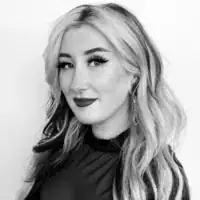 Brianna BowlingBrianna Bowling is a Hair Stylist and the Co-Owner of The CRAFT Salon in Glendora, California. With more than 11 years of experience, she specializes in balayage, blonding, and vivid colors. Brianna has received years of in-depth training on advanced color techniques.
Brianna BowlingBrianna Bowling is a Hair Stylist and the Co-Owner of The CRAFT Salon in Glendora, California. With more than 11 years of experience, she specializes in balayage, blonding, and vivid colors. Brianna has received years of in-depth training on advanced color techniques.
Hair Stylist For a dark purple shade, your hair needs to be at least level 6 or 7, which is a pale or orange-yellow color. For a lavender shade, it has to be a level 10, which is like a whitish-yellow.
For a dark purple shade, your hair needs to be at least level 6 or 7, which is a pale or orange-yellow color. For a lavender shade, it has to be a level 10, which is like a whitish-yellow. -
QuestionDo you have to bleach your hair to get purple?
 Brianna BowlingBrianna Bowling is a Hair Stylist and the Co-Owner of The CRAFT Salon in Glendora, California. With more than 11 years of experience, she specializes in balayage, blonding, and vivid colors. Brianna has received years of in-depth training on advanced color techniques.
Brianna BowlingBrianna Bowling is a Hair Stylist and the Co-Owner of The CRAFT Salon in Glendora, California. With more than 11 years of experience, she specializes in balayage, blonding, and vivid colors. Brianna has received years of in-depth training on advanced color techniques.
Hair Stylist You do unless you're naturally blonde. If you have black hair, there's no way to dye your hair purple without using bleach first. If you have dark brown hair it's possible to get a purple hint, but you'd probably have to bleach it first to get noticeable results.
You do unless you're naturally blonde. If you have black hair, there's no way to dye your hair purple without using bleach first. If you have dark brown hair it's possible to get a purple hint, but you'd probably have to bleach it first to get noticeable results.
Things You’ll Need
- Trash bags
- Towels
- Old clothes
- Gloves
- Purple dye
- Plastic wrap or shower cap
- Shampoo
- Conditioner
- Vinegar
- Paintbrush or foam craft brush (optional)
- Bowl (optional)
- Bleaching Kit (optional)
- Burgundy or plum dye (optional)
References
- ↑ Brianna Bowling. Hair Stylist. Expert Interview. 25 February 2022.
- ↑ https://www.racked.com/2017/6/14/15785910/hair-dye-woc
- ↑ https://www.racked.com/2017/6/14/15785910/hair-dye-woc
- ↑ https://www.vogue.co.uk/article/how-to-bleach-your-hair-like-a-pro
- ↑ https://www.vogue.co.uk/article/how-to-bleach-your-hair-like-a-pro
- ↑ https://www.vogue.co.uk/article/how-to-bleach-your-hair-like-a-pro
- ↑ https://www.vogue.co.uk/article/how-to-bleach-your-hair-like-a-pro
- ↑ https://www.vogue.co.uk/article/how-to-bleach-your-hair-like-a-pro
- ↑ Brianna Bowling. Hair Stylist. Expert Interview. 25 February 2022.
- ↑ https://www.allure.com/story/wine-purple-hair-color-trend
- ↑ Brianna Bowling. Hair Stylist. Expert Interview. 25 February 2022.
- ↑ http://galadarling.com/article/the-ultimate-guide-to-unnatural-hair-colouring/
- ↑ https://www.goodhousekeeping.com/beauty/anti-aging/tips/a26530/vaseline-for-skincare/
- ↑ Brianna Bowling. Hair Stylist. Expert Interview. 25 February 2022.
- ↑ https://www.womanmagazine.co.uk/fashion-beauty/hair/hair-tips-and-tricks/expert-tips-advice-dying-hair-at-home-5656
- ↑ http://galadarling.com/article/the-ultimate-guide-to-unnatural-hair-colouring/
- ↑ https://www.racked.com/2017/6/14/15785910/hair-dye-woc
- ↑ https://www.marieclaire.co.uk/beauty/how-to/how-to-dye-your-own-hair-6656
- ↑ http://galadarling.com/article/the-ultimate-guide-to-unnatural-hair-colouring/
- ↑ http://galadarling.com/article/the-ultimate-guide-to-unnatural-hair-colouring/
- ↑ https://www.elle.com/beauty/hair/news/g29826/colored-hair-tips/
- ↑ https://www.elle.com/beauty/hair/news/g29826/colored-hair-tips/
- ↑ https://www.herinterest.com/purple-hair-dye/
- ↑ https://www.herinterest.com/purple-hair-dye/
- ↑ https://www.elle.com/beauty/hair/news/g29826/colored-hair-tips/
About This Article
To get purple hair, you might want to bleach your hair first if it's dark so the color shows up better. If you don't want to bleach your hair, you can still dye it purple, but you'll probably want to dye it plum or burgundy first to create a good base. Either way, when you're ready to dye your hair purple, wash it with shampoo and lightly dry it so it's still damp. Once you're finished washing it, divide your hair into sections using clips, and apply some semipermanent purple dye to one section at a time. When you're finished, cover your hair with plastic wrap, and leave the dye in for 45 minutes. Wash your hair with a mild shampoo when the times up, then pour white vinegar over it to help the color last longer. For tips on how to maintain your purple hair, read on!
